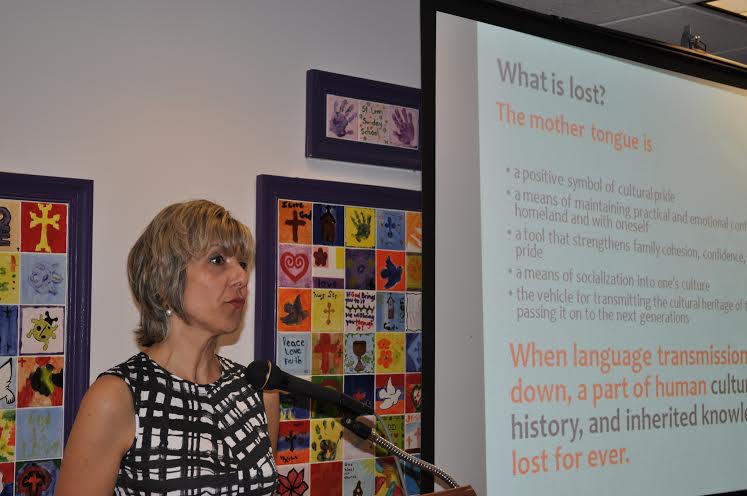Save the Western Armenian language

In 2012, UNESCO declared that Western Armenian will be classified as an endangered language along with the languages of various tribes of Africa, South America and Asia, without comparing the Armenian language as one of the world’s most civilized languages, perhaps even more than the indescribable dialects of the Ottoman Turks who planned and perpetrated the Armenian Genocide to wipe Armenians off the face of the Earth and to silence our centuries-old language.
On the threshold of the Centennial of the Armenian Genocide, the media and intellectuals have started calling the future of the Armenian language into question. This international organization for education and science declares that Western Armenian will live for only 86 years. Perhaps it is entitled to declare that, if it takes into consideration the fact that the number of students attending foreign schools in the most Armenian-populated community (Lebanese-Armenian community) has doubled compared to previous years. We’re not mentioning the 400,000 Armenians in France, the more than 1 million Armenians in Russia, the up to 1 million Armenians in America, as well as the Armenians in South America and other communities in the Middle East.
Dr. Arda Jebejian the linguist and psycholinguist delivered a extensive speech on all this at an event organized by the Educational and Cultural Center of Armenian Schools of the U.S. Eastern Diocese on May 16, 2014. A group of concerned Armenians had gathered at the Holy Ghevondyants Church in New Jersey to listen to an academic lecture that was an unquestionably unique lecture for the community. However, it was miserable to see how we talked about the loss of our language in the English language when more than 95% of the audience spoke and understood Armenian…
The speakers were introduced by Director of the Educational and Cultural Center of Armenian Schools of the U.S. Eastern Diocese Gilda Kubelian.
Dr. Arda Jebejian is from Cyprus and is author of 22 books devoted to language. In addition to the native language, she is fluent in 5 languages. She has been lecturing at the University of Nicosia since 2007 and has given lectures within various Armenian communities.
Jebejian compared the Armenian language with different languages on the verge of extinction, including the Jews’ Hebrew and Yiddish languages, which are being spoken again due to interferences of the community and the state throughout the past two decades. There is hope that in several decades, a new generation will emerge and will be fluent in those two languages of the Jews. This is part of the Jewish state policy according to which language remains the only guarantee for unity and to become a nation. Periodicals and publications are already being released in those two languages.
The keynote speaker deemed the adoption of new methods of Armenian language teaching more than necessary. She attached importance to the latest technologies in teaching and use of the Armenian language and called on educators and institutions to seek ways of doing that. To make Western Armenian more user-friendly, the speaker said it’s necessary to revise the educational system and introduce a curriculum that will be user-friendly and comprehensible.
It’s clear that most of the gathered wouldn’t have liked to hear Dr. Arda Jebejian’s negativism in relation to the Armenian language ahead of the Centennial of the Armenian Genocide, but how much longer can we pretend to not notice the disaster as we face the danger of losing our 2,000-year old language?
The gathered asked questions of their concern and made statements that might seem inappropriate for a different lecture, but the people expressing their views were speaking with concerns, giving the lecturer the chance to strictly address all parents who don’t encourage their children to spend more time with their grandparents, or who send their children to foreign schools, saying they’ll learn more, without taking into consideration the fact that the youth who graduate from Armenian schools in Lebanon hold the top offices in society, politics, trade and economy in different parts of the world.
The lecture was definitely helpful.
Hagop Vardivarian
New York




 Արևելահայերեն
Արևելահայերեն Արևմտահայերեն
Արևմտահայերեն Русский
Русский






